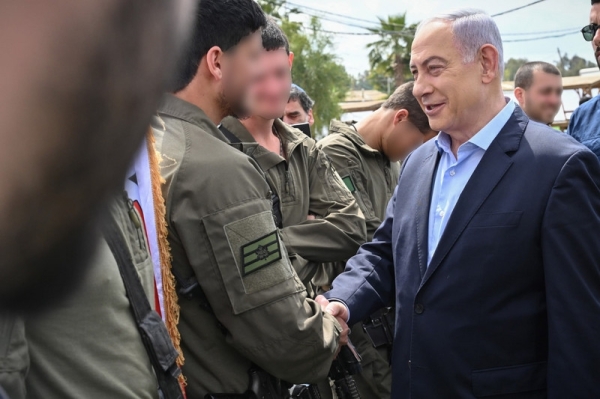EU says ‘famine’ in Gaza, as Israel vows Rafah invasion
Israel is moving ahead with plans to invade Rafah in southern Gaza despite US pressure, as the EU says "famine" has arrived in northern Gaza.
"There are international pressures to prevent us from entering Rafah and completing the job. As [Israeli] prime minister of Israel, I repel these pressures," said Benjamin Netanyahu on Thursday (14 March).
"We will enter Rafah, we will complete the elimination of the remaining Hamas battalions," he added, referring to a Palestinian militant group which attacked Israel on 7 October, killing some 12,00 people and taking about 250 hostages.
"This is a sacred mission ... We are determined to win — to achieve absolute victory," Netanyahu said, speaking to Israeli media and soldiers at the Israeli Defence Forces’s (IDF’s) Ofer base in southern Israel.
"Keep observing, flying, and attacking," he said.
The IDF also told the press on Wednesday the 1.5 million Palestinian refugees in Rafah would have to move to "humanitarian islands" in central Gaza to avoid Israel’s ground invasion.
"It’s like forcing the entire population of Birmingham [a UK town] out of the city and the suggestion that they will be safe simply cannot be given credence," said Christian Aid, a British charity, on Thursday.
The mounting "international pressure" saw the US threaten to withhold offensive weapons shipments to Israel earlier this month and US president Joe Biden call Rafah a "red line".
The US also imposed new sanctions on two Israeli settlements and three extremist Israeli settlers on Thursday.
But neither this nor EU diplomacy appeared to be holding Netanyahu back.
EU leaders are planning to urge him at a summit in Brussels on 21 March to "refrain from a ground operation in Rafah", according to a draft statement.
But Netanyahu also told Dutch prime minister Mark Rutte in Jerusalem on Wednesday that: "Entering Rafah was essential for realising the goals of the war".
The IDF has killed over 31,000 people in Gaza, leading the International Court of Justice in The Hague to say in January there was a "plausible" case it was committing "genocide".
But 500,000 people in northern Gaza now also risk starvation due to an Israeli aid blockade, the EU has warned.
"We already have a very strong and credible indication that there are pockets of famine already in the Gaza Strip," said EU aid commissioner Janez Lenarčič in Brussels on Thursday.
"On maritime and air routes for humanitarian aid to Gaza, I’ll be very clear: we and others are doing that exclusively because Israel is not opening more land routes," he added.
Lenarčič and US secretary of state Antony Blinken also took part in talks to deliver aid by sea from Cyprus on Wednesday.
One vessel carrying 200 tonnes of food is expected to reach Gaza on Thursday, at an undisclosed place and time for security reasons.
A second one carrying 300 tonnes was being loaded in the Cypriot port of Larnaca on Thursday with "legumes, canned tuna, vegetables, rice and flour", organisers World Central Kitchen said.
Speaking of the first shipment, Israeli authorities said on Thursday: "The delivery of the aid was facilitated after all the equipment on the ship underwent a security check and was accompanied by Israeli officials to ensure that humanitarian aid alone reaches the Gaza Strip".
Israel claims to be letting in aid trucks, despite Lenarčič’s denial.
But EU foreign-relations chief Josep Borrell, speaking at the UN Security Council in New York on Tuesday accused Netanyahu of sinister motives.
"Starvation is being used [by Israel] as a war arm [sic]," he said.
"This isn’t a natural disaster. It’s not an earthquake or a flood — it’s man-made," Borrell added.
Borrell has been the EU’s most vocal critic of Israel since Hamas attacks on 7 October.
"It does not make any sense to give me a dinner tonight, if you are going to kill me tomorrow," he said in Bahrain on 18 November, criticising the EU’s focus on providing aid instead of pushing for a ceasefire.

